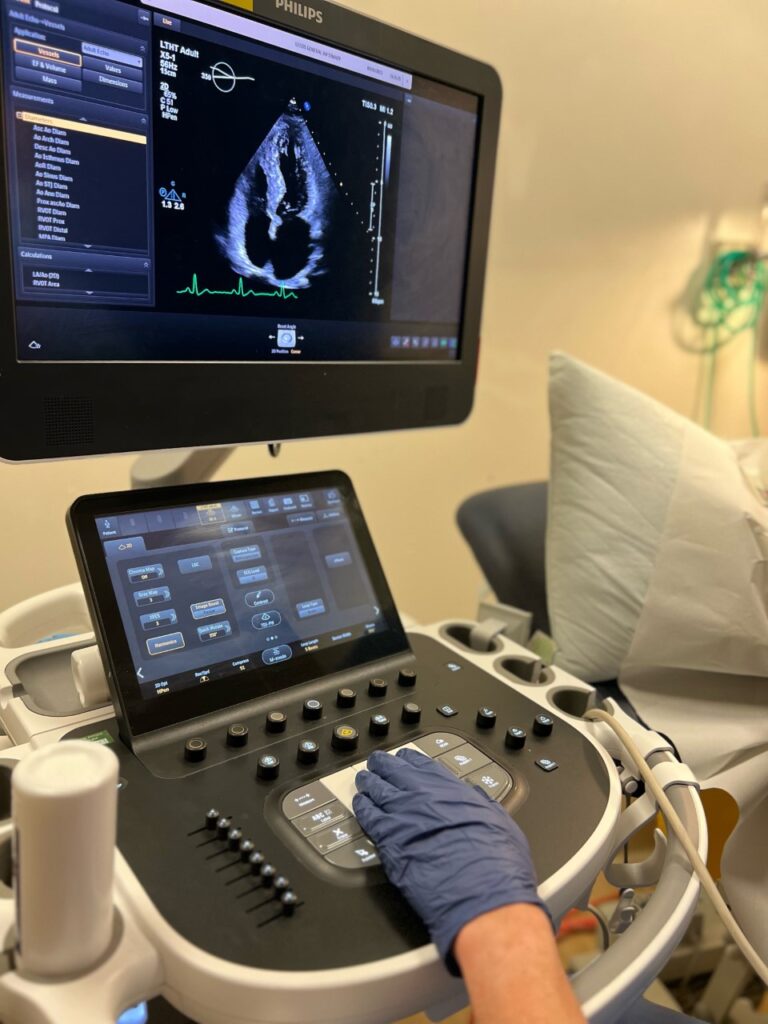This leaflet explains what to expect when you come to hospital for a Cardiac Ultrasound which is sometimes called an Echocardiogram or Echo. We hope it will answer some of the questions that you or those who care for you may have.

Find out more in our Patient Information video.
What is a Stress Echo?
A Stress Echocardiogram is an investigation performed to examine the heart muscle and valves during exercise using ultrasound imaging. The test is safe and painless. You will either walk briskly on a treadmill, pedal on a specially adapted bicycle or receive an intravenous infusion (Dobutamine) to increase the heart rate.
In most cases, we will need to use an ultrasound contrast agent, which allows us to see your heart clearly. A small plastic tube called a cannula will be inserted into a vein in your arm so that the contrast can be injected. You should not feel any adverse effects from the contrast, however some people may have a reaction, the risks and complications will be fully explained to you before the test. The tube will be removed before you leave the department.
During the test we will be monitoring your ECG and blood pressure. You will be asked to undress to the waist and you will be provided with a gown (please wear a top that can be removed easily) and you are advised to wear comfortable, low heeled walking shoes/trainers.
You will then be asked to lie on your left side on a scanning couch and a small amount of ultrasound gel will be firstly applied to the centre of your chest; the ultrasound probe will then be moved into different positions, beneath the left breast area, under your rib cage and on the base of your neck.This allows images of your heart to be obtained from different angles. The exercise/medication stage of the test follows this initial scan, the images are then repeated whilst your heart is working at its hardest.
The test takes approximately one hour and every attempt will be made to keep to your appointment time but occasionally delays are unavoidable.
Why am I having this test?
This is a test used frequently to diagnose and assess angina (a pain associated with coronary artery disease). It does this by looking to see whether there is an adequate blood supply to your heart muscle when your heart rate is increased. We also occasionally use a stress echo to assess other conditions such as valvular heart disease.
Who performs the test?
The test is performed by a Cardiac Physiologist and a nurse. Please be aware that there are both male and female physiologists and nurses working in the department. If you require a chaperone or a female sonographer, please contact the department as soon as possible.
Are there any precautions I need to take before the scan?
You can eat and drink as normal before the test. Do not take any medicines that slow the heart down for 48 hours prior to the test, unless advised otherwise by your cardiologist. These include Atenolol, Bisoprolol, Diltiazem, Ivabradine, Metoprolol, Propranolol, Verapamil, Carvedilol, Nebivolol, Sotalol and Timolol. Your appointment letter should clarify whether stopping these medications is necessary.
Are there any risks to the scan?
Ultrasound is considered a safe test. You will have opportunity to discuss any concerns with your Physiologist and Nurse on the day, prior to your scan.
If you have a Pharmacological infusion test, you may experience minor side effects such as headache, nausea and tingling (in the head, fingers or feet), blurred vision and a dry mouth. These effects usually wear off a few minutes after the infusion is stopped. There are no limitations to what you can do after the scan, you can carry on as normal.
How do I get my results?
A report will be written by the sonographer after the scan and will be sent on to the doctor that referred you for the test. The doctor will then be in touch with the results or will discuss them with you at your next appointment.
Can I get an Interpreter?
If English is not your first language we will need to know at least 72 hours before your appointment so that we can book an appropriate Interpreter. We do not allow family or friends to act as an Interpreter.
What happens if I am late or fail to attend my appointment?
If you are late for your appointment you may not be seen, if you think you are going to be late you should contact the department to confirm if you will be seen or not. If you fail to attend you will not automatically receive another appointment. Your referral will be returned to the Doctor who requested the test.
If you need to change your appointment
If you need to cancel or reschedule your appointment please contact the department on these numbers:
Leeds General Infirmary
0113 392 2569
St James Hospital, Seacroft Hospital and Wharfedale Hospital
0113 206 5930 or 0113 206 4759
For more information about outpatient appointments at The Leeds Teaching Hospitals NHS Trust hold your smartphone camera over the QR code and follow the link.